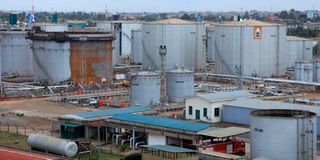High Court declines to reopen KPC, KenolKobil breach of contract dispute

Kenya Pipeline Company petroleum storage facility in Industrial area, Nairobi in this photo taken on January 22, 2021. The High Court has declined to reopen litigation of a multibillion-shilling dispute between Kenya Pipeline Company and KenolKobil arising from a breach of contract.
What you need to know:
- The dispute emanated from an agreement signed in 1999 where KPC agreed to provide transportation of the oil marketer’s petroleum products.
- KPC moved to court seeking orders that the reassessment of loss and damages awarded by Mr Abdullahi in arbitral proceedings be set aside.
- The oil marketer had accused KPC of failing to facilitate the berthing of various ships carrying its petroleum products worth Sh9 billion by failing to allocate its storage space.
The High Court has declined to reopen litigation of a multibillion-shilling dispute between Kenya Pipeline Company and KenolKobil arising from a breach of contract.
The dispute emanated from an agreement signed in 1999 where Kenya Pipeline agreed to provide transportation of the oil marketer’s petroleum products through its systems and deliver it to specified points.
After the alleged breach, the matter was referred to an arbitrator, Mr Ahmednasir Abdullahi, an advocate who in 2009 directed KPC to pay the oil dealer Sh4.6 billion for contravening a transportation and storage agreement.
KPC moved to court seeking orders that the reassessment of loss and damages awarded by Mr Abdullahi in arbitral proceedings be set aside.
However, Justice Wilfrida Okwany said the court case had run its full course all the way to the Court of Appeal before finding its way back to the High Court.
She observed that since the matter had been litigated at the Court of Appeal, the appellate judges were better placed to determine whether the arbitrator complied with the direction issued to him.
“To entertain the matter again will result in a scenario of a back and forth or merry-go-round system of litigation with no end in sight,” said the judge.
And in view of the fact that the final order that led to the reassessment of loss and damages by the arbitrator emanated from the Court of Appeal, Justice Okwany said the High Court could not interrogate the said decision to establish whether the reassessment was done in compliance with the appellate court’s directive.
Failure to facilitate
The oil marketer had accused KPC of failing to facilitate the berthing of various ships carrying its petroleum products worth Sh9 billion by failing to allocate its storage space.
KenolKobil complained that Triton Petroleum Company, among other companies, occupied more than their fair share of allocation, forcing ships to queue offshore before discharging their products.
Mr Abdullahi had explained that the hefty arbitral award comprised damages for loss of consumer goodwill, cost of public relations, marketing campaign and loss of financial goodwill.
The arbitrator faulted the KPC for allowing the fallen Triton Petroleum Company to use its facilities to store oil products and in the process reduce the ullage available in the industry.
Aggrieved by the award, KPC challenged the decision in the High Court.
In 2012, the High Court remitted the matter to the arbitrator for reconsideration but not satisfied, KPC affirmed the High Court’s decision by directing the parties to head back to the arbitrator for assessment of loss and damages.
According to the contract, KPC was not permitted to extend to any other party the usage of its systems in the transportation, storage and delivery of the oil products apart from KenolKobil. The arbitrator said in his ruling that KPC breached some fundamental provisions of the contract signed between the state corporation and KenolKobil.
The arbitrator made his decision in 2016 but KPC was not pleased and filed a second appeal, accusing Mr Abdullahi of going beyond the scope of the dispute and veering from the direction of the Court of Appeal.
KenolKobil opposed the case, saying KPC attempted to re-litigate the dispute.
Justice Okwany noted the Court of Appeal was silent on what should happen in the event one of the parties was dissatisfied with the said reassessment.
"My finding is that this court is functus officio, having already considered the matter on appeal and cannot turn back and deliberate on yet another round of a dispute over the same matter," she concluded.





